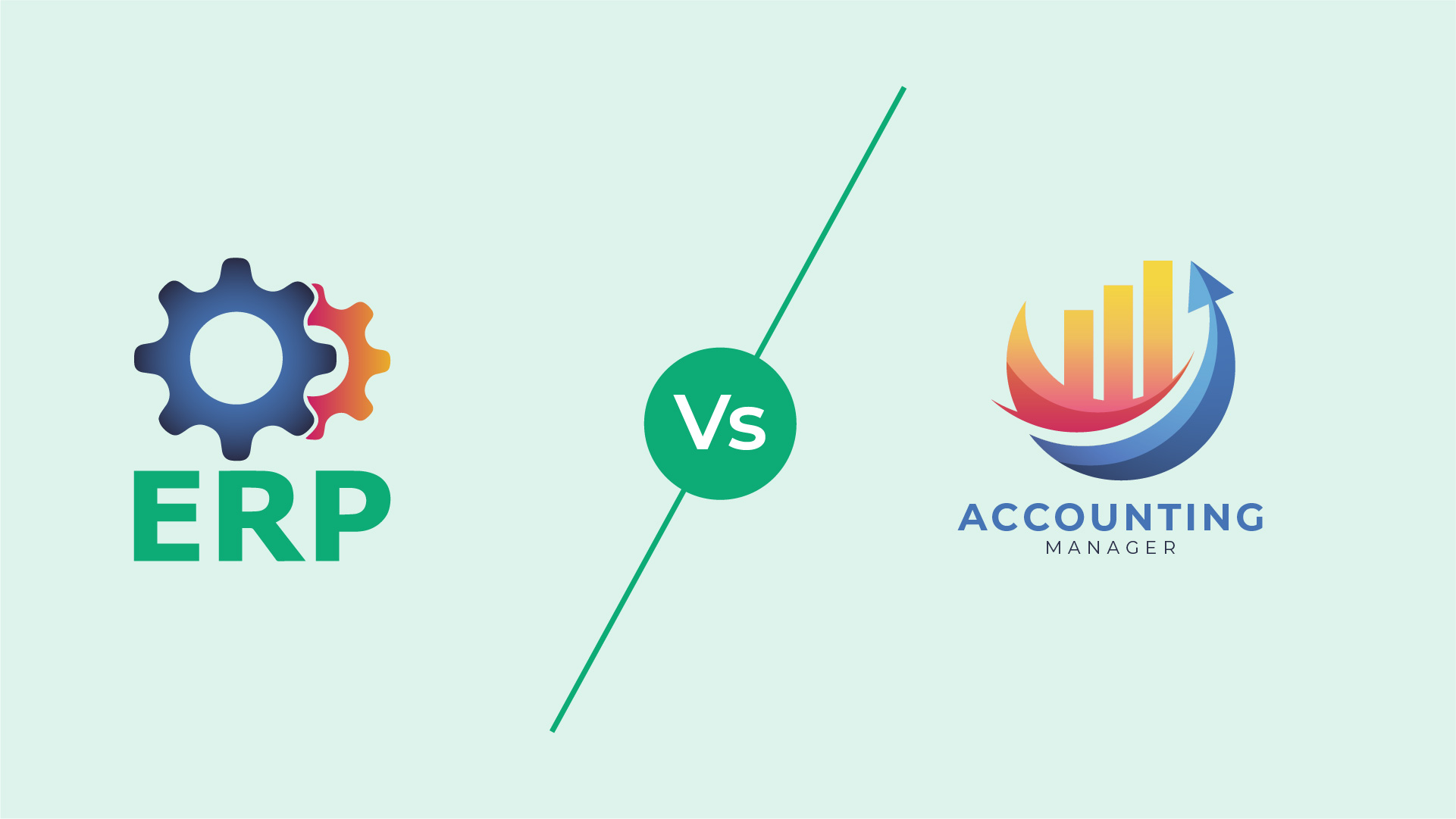An ERP system contains many of the same features as the average accounting software package. They are sometimes confused with each other, but make no mistake – they are completely disparate systems. Whether or not you need a complete ERP solution or an accounting software package depends on your business needs and what you want to achieve. Let’s dive into the main differences between an ERP system versus standard accounting software.
What Does Accounting Software Do?
Accounting software is primarily concerned with the financial management and performance of your business, including recording your profit/loss and overall cash flow. Key features may include:
- Revenue management, including general ledger, accounts payable, and accounts receivable
- Payroll services, timesheets, and billing
- Financial project management
- Bank management
- Necessary financial reports, including income statements and an overview of the company’s financials
- Cost management
Accounting systems are mainly used by your finance department and are designed to manage one specific area of your business operations. Accounting software is extremely ubiquitous and used in virtually every business, whether big or small. In small businesses, you rarely need more functionality than what your accounting software provides. The front office can manage inventory and customer relationships through manual processes and spreadsheets. However, as the business processes become more complex and the company’s growth outpaces your legacy system, you may need to consider switching to ERP software to improve operational efficiency and maintain business agility.
What Does ERP Software Do?
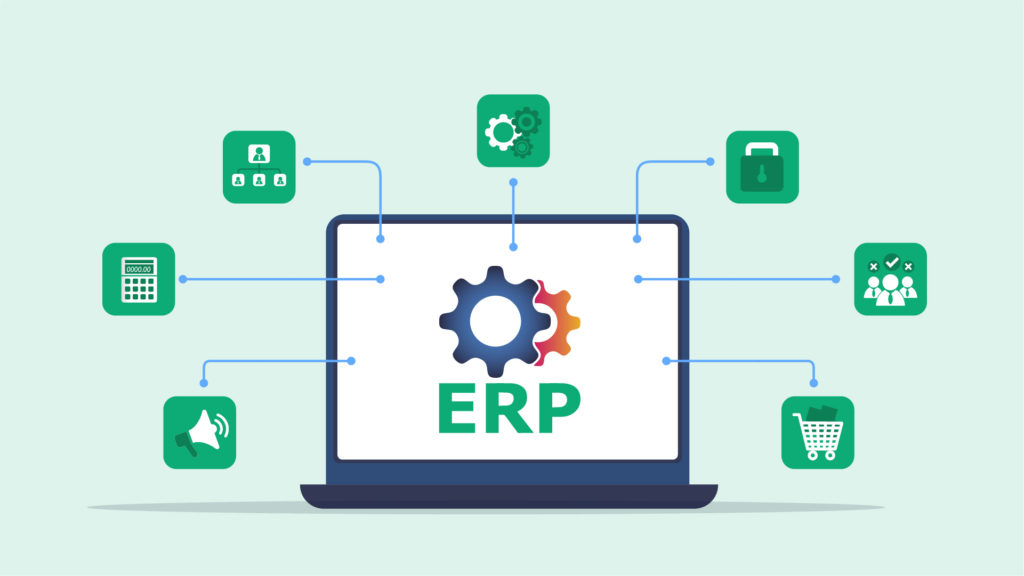
Enterprise resource planning (ERP) software is a fully integrated system that covers almost all key business functions. Many companies start by using accounting software while their order volumes are low and easily managed and then switch to a more comprehensive ERP solution as their business needs change.
Unlike the average accounting software suite, your ERP solution will usually include features designed to meet industry-specific needs, like landed cost tracking, lot tracking, barcode scanning, warehouse management, or document management. An integrated ERP system can track and manage your financial resources, tangible and intangible assets, material management, human resources, customer relations, product lifecycles, work hours, and more. With an ERP solution, you can access many of the same functions as accounting software and all the tools you’ll need to manage your entire supply chain and logistical needs.
Crucial Differences Between ERP and Accounting Software
Up until now, it’s been entirely possible for many businesses to get away with little more than QuickBooks and a physical inventory book. However, the world is changing rapidly – and so are customer expectations. There’s more data to manage, more competition, and a much greater demand for faster delivery, personalization, and greater data transparency.
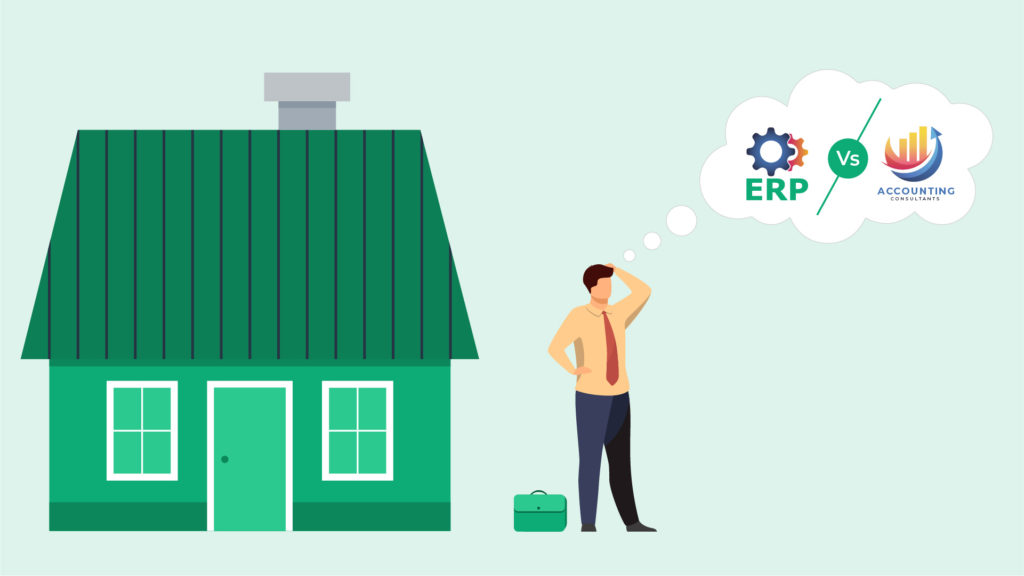
Accounting software simply isn’t designed to meet or support these dynamic changes or needs. They also cannot adequately forecast where the business is going and what it will need in the near or distant future.
ERP solutions can bring different data sources across multiple departments into one system that can improve decision-making, streamline sales and inventory, detect process deficits and provide real visibility into purchasing, production, warehousing, and inventory. Whereas accounting software is the domain of the accounting and financial management team alone, ERP solutions can be used across all departments and specialities.
Your ERP solution can scale and grow as the company does, so you’ll be able to respond quickly to changes in the market, accommodate shifting customer or business needs, and boost productivity. The two systems differ in a few key ways:
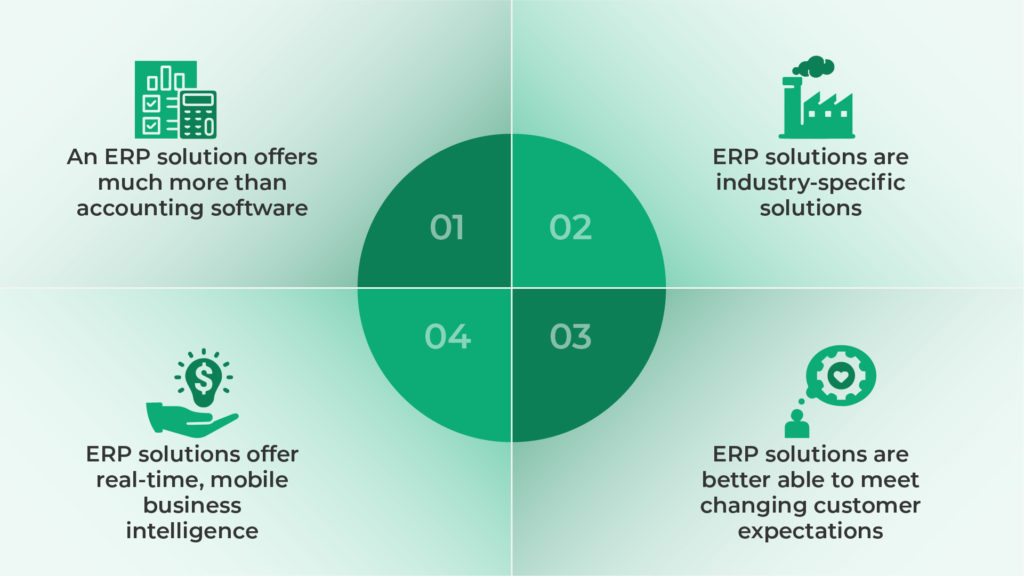
1. An ERP solution offers much more than accounting software
An ERP solution offers everything an accounting solution does – in addition to enterprise-wide insights and features, including Inventory Management, Quality and Warehouse management, Sales and Purchasing Data, CRM, human resources management, and more. In short, accounting software is just a subset of a robust ERP system.
2. ERP solutions are industry-specific solutions
Accounting software is designed to fulfill a very specific function and does it extremely well. However, it’s limited. Your account software won’t be able to track inventory for manufacturing resource planning or distribution purposes. Yes, some add-ons promise to fill the gaps, but this may lead to integration issues and an unnecessarily complex IT environment that must be actively updated and managed.
ERP solutions can help manufacturers and distributors manage inventory, reduce stock carrying and storage costs, lower labor costs, and make accurate data-driven decisions. The entire shop floor execution system can be managed from start to finish, including product planning, supply chain management, supply chain shipments, production resources, and more.
3. ERP solutions are better able to meet changing customer expectations
In addition to robust inventory and sales management functions, many ERP vendors include a CRM module so that you can seamlessly manage customer relationships and communication. Accounting software doesn’t include these capabilities, so you’ll have to rely on manual processes or expensive add-ons.
4. ERP solutions offer real-time, mobile business intelligence
A good ERP system will gather the same financial reporting data as accounting software – as well as the data collected from a wide variety of core business processes – in a single system. There’s no need to purchase multiple tools to manage the needs of your business. ERP technology will make company-wide, real-time data available in the cloud, in a single database, where authorized managers can access it at any time – even via secure mobile devices.
ERP vs. Accounting Software: How Do I Know Which One Is Right For My Business?
ERP has started co-opting the market for accounting software, particularly among ambitious, growing businesses that have outgrown their account solutions. After all, ERP solutions offer the same financial management functionality, plus the operational functionality and integrated management system needed to support modern business processes. Financial management, planning, and budgeting may have been sufficient a decade ago, but the same data and functionality seem rudimentary today. Businesses demand more, as do their customers.
So, how do you know which of the two systems is right for your business? A small business doesn’t need the same tools or degree of automated processes necessitated by a large business. Your industry-specific needs will dictate whether or not you need ERP or accounting software. For instance, a service business doesn’t need the inventory management or material requirements planning capabilities that a large manufacturing business does.
Even so, there might be subtle signs that you are outgrowing your accounting software, whether they are internal or external. If you are spending too much time manually entering data or completing paperwork, you are probably in dire need of a new solution to increase efficiency.
Similarly, if you find yourself unable to keep up with what is happening across the organization, with key employees in different offices or even geographies and dozens of spreadsheets and share drives, your accounting software just isn’t compatible with your needs anymore. A good ERP solution will give you insight into finances, stock levels, and more.
You might also find that you are purchasing more and more add-ons and systems, like CRM or HRIS. This is not expensive but can lead to a higher risk of incorrect information as it becomes harder to manage data across multiple sources. Having a single, centralized, integrated system that increases visibility and enhances efficiencies will be a game-changer.
That being said, there is a real push towards more comprehensive software suites, and accounting software is becoming dated. While the two software suites, ERP and accounting, currently co-exist, this is starting to shift. ERP software solutions are expected to see a compound annual growth rate (CAGR) of 10.7% between 2022 to 2030. According to a survey by Accenture, 76% of companies in the US and UK have said that ERP systems have contributed significantly to their competitive advantage and strategic value.
It simply doesn’t make sense to adopt both systems, especially if you believe your business will outgrow your current manual processes and require additional features to manage your warehouse, inventory, and eCommerce. Your ERP system will provide all of the accounting functionality you need while enabling the entire organization to work cooperatively in a more effective, transparent manner and cutting costs through shared service centers.
How Do I Find The Best ERP Solution?
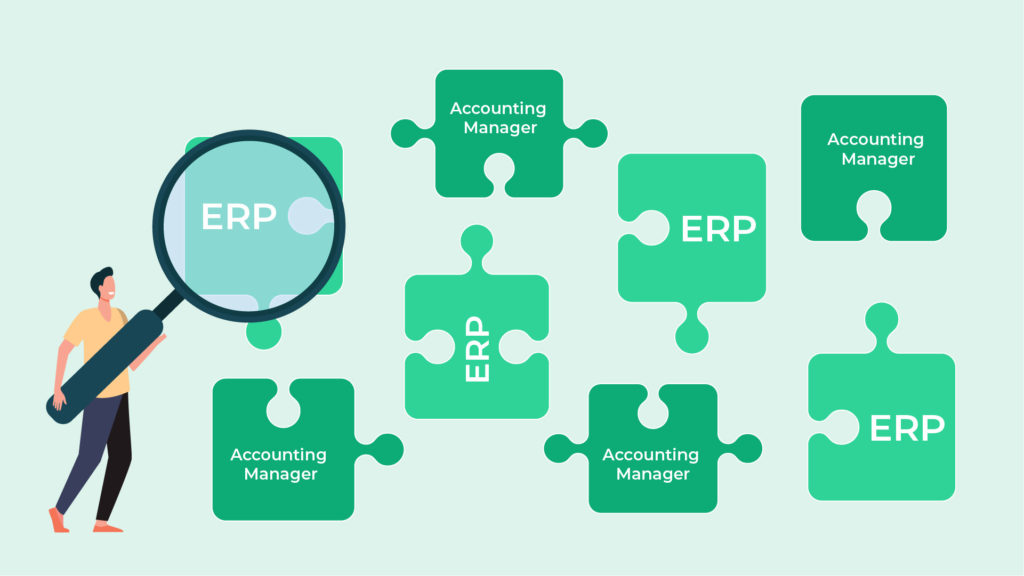
Having said all that, not all ERP systems are made equal. And here’s a scary statistic: 70% of ERP implementations fail. There’s a good reason for that – mainly that ERP software vendors simply don’t collaborate or support their customers. ERP software implementation is often the domain of expensive consultants and third-party software vendors and not the people who designed the software themselves. Choosing the wrong vendor can lead to expensive customizations and poor results that leave you no better off than you were with Quickbooks and your inventory book.
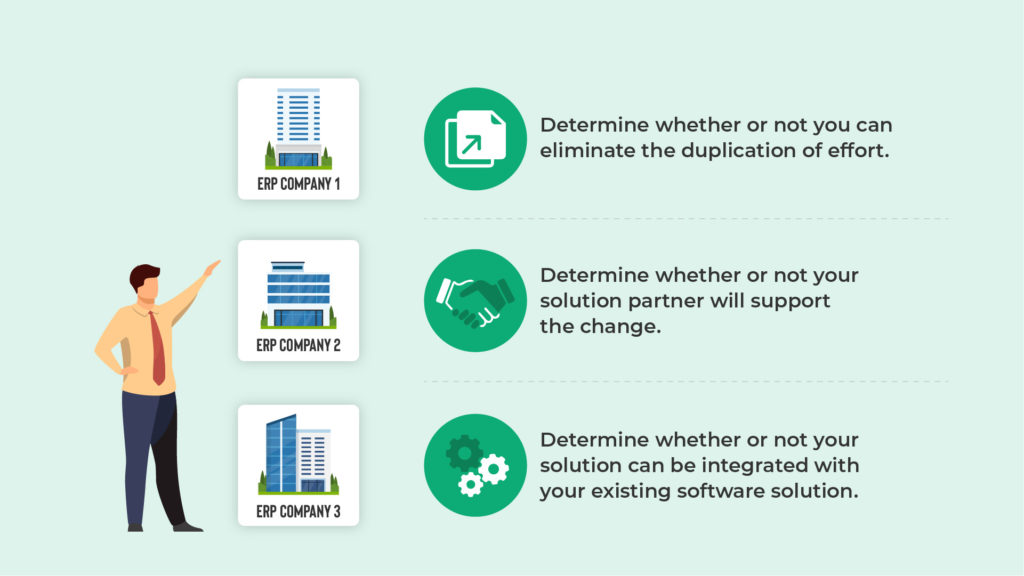
Here’s what you should be looking at when choosing vendors:
- Determine whether or not you can eliminate the duplication of effort. Good ERP solutions can eliminate the duplication of effort across departments, especially when it comes to reporting information. A good ERP solution will facilitate a single reporting UI that will store the information that various departments, from HR to accounts payable, need to access during their normal business operations. If your business can benefit from greater streamlining, you need an ERP solution.
- Determine whether or not your solution partner will support the change. You may have heard about, and been seriously perturbed by, the many high-profile “ERP failures” that have made headlines in recent years. Many of these failures are a result of a poor implementation process and lack of buy-in; ERP companies that simply provide the solution and a consultant without making any effort to contribute to the success of the product. If you do switch to an ERP system, make sure that your software solution provider is willing to go the extra mile to help you and your staff adapt to the change.
- Determine whether or not your solution can be integrated with your existing software solution. Your ERP solution should be comprehensive, but you should still look for a solution that works with the existing business software you already have in place that may not be effective to consolidate into your ERP. It may seem trivial, but choosing an ERP solution that can readily integrate with your existing email solution, document management, HR, supply chain, or CRM will save you a lot of implementation, migration, and adoption headaches down the line.
Finally, pick a vendor that builds, implements, and manages your ERP software and is willing to meet your needs. At 10X ERP, we believe that no one will be able to implement and understand our software solution better than the people who designed it (which happens to be us!). We don’t hand the business of understanding your unique needs and operating environment up to consultants or resellers that simply don’t have the insight into our system that we do.
If you would like to know more about our ERP solution, feel free to reach out to us for an obligation-free demo.
